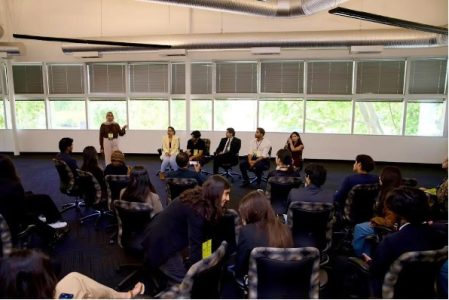Widgetized Section
Go to Admin » Appearance » Widgets » and move Gabfire Widget: Social into that MastheadOverlay zone
The Leadership Pipeline We’re Not Paying Attention To
The views expressed are those of the author and do not necessarily reflect the views of ASPA as an organization.
By Areeba Yasin
June 16, 2025

Ten minutes before our first-ever event was scheduled to begin, the check-in table was still empty. Our team—enthusiastic but new to organizing—was scattered across tasks. Out of the corner of my eye, I saw one of our volunteers quietly approach the table, begin sorting name tags, arranging materials and warmly welcoming guests as if it had always been their job. No one assigned them the task. They simply noticed what was needed and took initiative. That small, decisive moment has stayed with me as one of the clearest illustrations of leadership: noticing a need and responding, not for credit but because it matters.
We tend to define leadership through credentials—titles, degrees, fellowships—but some of the most powerful leadership I’ve witnessed came without those markers. When launching OPEN Silicon Valley’s Young Professionals chapter, there were no set titles, guidelines or guarantees. In fact, there wasn’t even a team; I had to build one from scratch, learning to recognize strengths beyond resumes and trusting in the shared purpose that brought us together. Instead of just tracking follower counts or formal KPIs, we saw success in the relationships that formed, the growth within our team and the quiet confidence that emerged as people stepped into roles they never imagined for themselves.
That process taught me something no formal program ever had. Leadership doesn’t always announce itself. It often shows up quietly: in small decisions, moments of ownership and in people who offer their creativity and judgment simply because they want to contribute to something meaningful.
At OPEN SV, I witnessed this kind of initiative time and time again. During a critical period, when we needed to streamline member data and improve internal systems, one volunteer quietly wrote custom code that transformed how we tracked engagement, drawing directly on their professional background in analytics. Another team member recognized a looming funding gap and, without being asked, pitched a sponsorship proposal to a company in their network, ultimately securing crucial support. These weren’t assigned tasks; they were strategic, high-skill contributions driven by foresight, ownership and care. And they weren’t exceptions. Volunteers regularly drew on skills they had developed elsewhere—coding, project management, writing, outreach—and applied them in new contexts. In doing so, they cultivated instincts we often try to teach in structured programs: collaboration, emotional intelligence, adaptability and strategic thinking.
Still, this kind of leadership is often overlooked. We tell young professionals to pursue formal internships or fellowships, as though leadership only counts when it comes with a defined role and outcome. But if we ignore the growth that happens through skilled volunteerism, we miss a vital part of the leadership pipeline.

Maybe it’s time for that to change. What if resumes made space for the kind of work that doesn’t fit neatly into job titles? What if employers, universities and funders valued self-directed leadership—the kind that develops through navigating ambiguity, building teams from scratch and making real things happen with no guarantee of success?
If we want to cultivate leaders who are adaptable, empathetic and grounded in service, we have to look beyond formal structures. We have to pay attention to where people already show initiative, use their skills creatively and lead by doing.
Reflecting on my time with OPEN SV, the most meaningful leadership moments didn’t happen on a stage or behind a title. They happened in quiet acts of responsibility, in volunteers who saw their role as something bigger than a task list and in people who stepped into growth without being asked. That kind of leadership may not come with a credential, but it’s often the kind that lasts.
Maybe it’s time our institutions caught up with what skilled volunteers already know: authentic leadership doesn’t begin with a title. It begins with a decision to care, to contribute and to lead when no one is watching.
Author: Areeba Yasin is a nonprofit strategist and communications professional focused on impact-driven leadership, cross-sector collaboration and community engagement. She currently supports a climate tech startup with branding and partnerships and previously led fundraising at SF New Deal. At OPEN Silicon Valley, she chairs social impact programs that cultivate leadership, advance equity and foster sustainable change. Contact email: [email protected]






Follow Us!